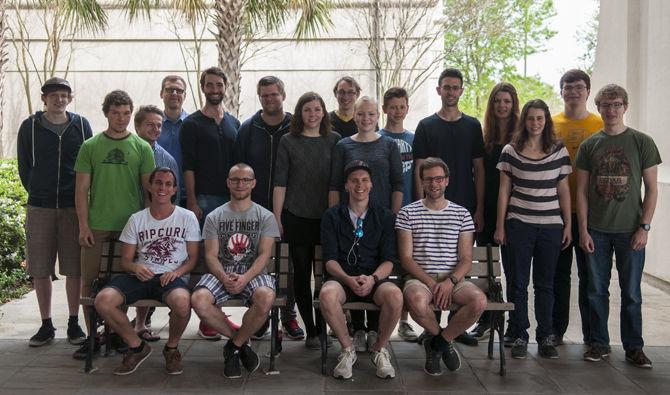Before they left the Friday before spring break, technical engineering, venture capitalism and weekly crawfish boils made their way into twenty German students’ three-week stays on campus. From their Cook Hotel lodgings to local and statewide outings, the engineering majors left with a closer glimpse of American life and a renewed perspective on entrepreneurship.
The German-American Fulbright Commission sponsored a grant allowing students from various German universities to participate in an education-inspired, culture-infused University program for the first time. Geared toward fostering a relationship between engineering and entrepreneurship, the University’s Office of International Programs administered the program.
Assistant Director of International Programs Jill Fisse said the Commission approached director Harald Leder about the program because of the University’s international prestige in its engineering and business programs.
“Entrepreneurship isn’t really something that’s taught in German universities, so it provided a unique experience for [the students] to learn about,” Fisse said.
Inez Johnson, one of the program’s organizers, said they collaborated with the University’s College of Engineering and E.J. Ourso College of Business for the program.
Through the College of Engineering, she said German students shadowed University capstone students working on various projects. With the College of Business, Johnson said program participants sat in different classes to experience an American college classroom.
Johnson said they also toured different sites, such as NASA’s Stennis Space Center, the Badische Anilin-und Soda-Fabrik (BASF) facility and the Louisiana Technology Park business incubator. These educational supplements were complemented by weekend excursions to Avery Island, Oak Alley Plantation and a swamp tour, to name a few.
Industrial engineering and business administration senior Sabrina Weixlgartner, one of the program participants, said she immediately recognized the amount of waste in the United States compared to Germany.
“If you go to Walmart [here], you get about 20 plastic bags,” Weixlgartner said. “You would never get a plastic bag in Germany — you would have to pay for each.”
Nano engineering senior David Ali Pawlak said he was surprised by how comfortable Americans are with funneling money into their companies and investing in the unknown. Despite “risk[ing] their whole existence financially,” Pawlak said that same faith earns companies their credibility and ultimately leads to their success.
The group met different business owners, both with and without college degrees, who taught them failure is one of the steps to success — a mentality not shared in German classrooms, he said.
Mechanical engineering senior David Sachs said his native country tends to avoid failure.
“In Germany, we have the opinion that if you fail once, you’re going to fail twice,” he said. “In the United States, it’s completely different.”
During the program, Sachs said they had a meeting with different engineering students and a professor where they discussed myths of entrepreneurship. After the meeting, he said he felt a new sort of confidence about “the American way” of business — diving in headfirst with an expected margin of failure.
Between the campus lectures and local field trips, Sachs said he wants to become more active in fostering entrepreneurship for his university and the German economy as a whole.
“My fear went away, and I’m looking forward to starting my own company,” he said.
University focuses program for German students on engineering, entrepreneurship
March 29, 2016
German students gather for a group photo Friday, March 18, 2016, after visiting the University and experiencing Louisiana culture thanks to a grant sponsored by the German-American Fulbright Commission.
More to Discover







